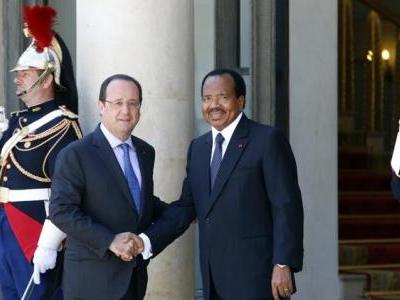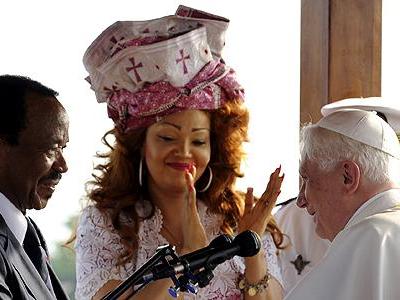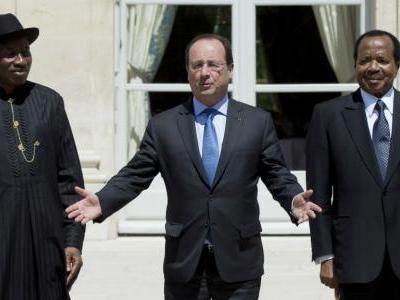Fri, 05/23/2014 - 18:01
Old suspicions dog joint Nigeria-Cameroon Boko Haram fight
The West Africa Twittersphere was buzzing in the lead-up to the May 17 Paris summit on Nigeria’s security.
Would he personally show up or would he simply send a representative? The guessing game was replayed at think-tanks, policy briefings and pre-summit interviews as experts expounded on his advanced age and avowed disdain for international meetings.
Minutes after French President François Hollande, as summit host, greeted his Cameroonian counterpart at the entrance to the Elysée presidential palace, journalists were still receiving tweets from followers across the region seeking confirmation that Paul Biya himself was attending the talks.

One of the key achievements of the Paris talks was the fact that Hollande had managed to bring together six African heads of state at short notice following the international outcry over Boko Haram’s kidnapping of more than 200 Nigerian schoolgirls last month.
The focus of the summit was to hammer out a regional response to the Boko Haram threat between Nigeria, Benin, Cameroon, Chad and Niger.
All five countries share land borders with Nigeria. But the 1,690-kilometer frontier with Cameroon is the longest and poses the greatest security challenge, with Boko Haram fighters in northeastern Nigeria infiltrating the porous border, conducting attacks and kidnapping Western nationals in Cameroonian border towns.
Just hours before the summit began, suspected Boko Haram militants attacked a Chinese work site in a Cameroonian border town, killing one person and underscoring the urgent need for cross-border counter-terror measures.
The intense focus on Biya’s presence in the lead-up to the Paris summit highlighted Cameroon’s key role in tackling the regional threat as well as the thorny state of Nigerian-Cameroonian relations – and what that spells for the fight against Boko Haram.
Cameroon’s ‘absentee landlord’ president
Extending from Lake Chad in the north to the Bakassi peninsula on the Atlantic Gulf of Guinea, the Nigerian-Cameroonian frontier has been a source of a decades-old, sometimes violent, dispute between the two countries.

The border issues in the northernmost Lake Chad area and the oil-rich Bakassi region were finally sorted via international mediation more than a decade ago – in Cameroon’s favour.
But tensions between the two countries have simmered, with suspicions mounting in recent times over the Boko Haram threat.
Nigerian officials complain that Boko Haram militants fleeing Nigerian security operations have sought shelter in Cameroon’s Far North Region and that the Cameroonian authorities are not doing enough to tackle the threat.
Speaking to journalists off-the-record, French officials have also voiced alarm that the Cameroonian government in the capital of Yaounde has viewed the threat as a Nigerian issue and refused to acknowledge the extent of the destabilisation in the Far North Region.
Biya, Cameroon’s 81-year-old leader who has been in office for more than 30 years, currently spends extended periods abroad living in a Swiss hotel and has left the day-to-day handling of state affairs to his ministers, according to Western diplomats who decline to be named. His critics in Cameroonian opposition circles derisively refer to him as “the absentee landlord”.
One of Africa’s longest-serving leaders, Biya – also known as Cameroon’s “lion man” – and his wife, Chantal – the flamboyant, orange-haired first lady dubbed “the Queen of Hearts” – have occasionally made the headlines in Europe over their extravagant vacation bills.

A short, courteous man, Biya has been known to stay away from international gatherings, including the centennial celebrations marking Nigeria’s unification earlier this year.
In cross-border ‘hot pursuit’ of terrorists
The much-awaited Paris face-to-face meeting between Jonathan and Biya, which followed the kidnapping of the schoolgirls from the Nigerian village of Chibok near the Cameroonian border, provided a key opportunity for the two leaders to agree to security cooperation measures.
One of the key sticking points has been the ability of Nigerian troops pursuing Boko Haram militants to cross national borders.
Nigeria has already reached an agreement with Niger to allow its troops to cross the border in pursuit of Boko Haram, and is discussing a similar agreement with Chad.
Cameroon however has been reluctant to allow Nigerian troops with a track record of human rights violations to conduct operations on Cameroonian soil.

Addressing his regional partners at the Paris summit, Jonathan noted that it was “important that we accept the principle of hot pursuit of terrorists in the context of joint border patrols and cooperation in order to deny them sanctuaries and make it impossible for them to take refuge in each other’s territory. I note with satisfaction that some mechanisms for joint border patrols including customs and immigration administration have commenced.”
When militants cooperate, but governments don’t
But thousands of miles away from the promises made in European capitals, putting the words into action is easier said than done.
In an interview with FRANCE 24’s sister station RFI days after the summit, Cameroonian Foreign Minister Pierre Moukoko Mbonjo dismissed the need for joint cross-border patrols. “It’s not necessary to have joint patrols. The most important is that information flows between our two countries so that each country respects the territorial integrity of the other,” said Moukoko Mbonjo.
Despite the commitment to “information flows,” security experts note that the lack of bilateral trust poses several intelligence-sharing challenges.
There have been signs of growing discontent among Nigerian troops who complain of inadequate equipment to fight Boko Haram militants. Last year, Jonathan said he suspected Boko Haram members and sympathisers had infiltrated every level of his government and military, including the Cabinet.
That does not inspire trust among countries committed to intelligence sharing. Following the Chibok kidnappings, the US, France and Britain have all sent experts to help find the girls, but French and US officials have expressed concerns about how any information might be used.
In sharp contrast with the challenges confronting Nigeria’s regional and international partners, Islamist militants in Africa have succeeded in cooperating across porous national borders.
Following the jihadist takeover of northern Mali in 2012, Boko Haram militants received training and established ties with Islamist groups based in the Sahara and the Sahel, including al Qaeda’s regional arm, AQIM (al Qaeda in the Islamic Maghreb). The links have enabled weapon flows from Libya following the 2011 ouster of Muammar Gaddafi to permeate borders across the region.
With their scant regard for national borders in their quest to form a dream caliphate, jihadist groups are also able to attract foreign fighters. Nigerian officials believe Boko Haram, which began as a local Islamist group more than a decade ago, now has foreign fighters, including Chadians and Cameroonians.
Over the weekend, leaders from across the African continent are meeting in Pretoria ahead of South African President Jacob Zuma’s inauguration. The rhetoric, once more, is likely to be dominated by talk of African solutions to Africa’s security problems. But that, as we have seen in the past, is easier said than done.
Would he personally show up or would he simply send a representative? The guessing game was replayed at think-tanks, policy briefings and pre-summit interviews as experts expounded on his advanced age and avowed disdain for international meetings.
Minutes after French President François Hollande, as summit host, greeted his Cameroonian counterpart at the entrance to the Elysée presidential palace, journalists were still receiving tweets from followers across the region seeking confirmation that Paul Biya himself was attending the talks.

One of the key achievements of the Paris talks was the fact that Hollande had managed to bring together six African heads of state at short notice following the international outcry over Boko Haram’s kidnapping of more than 200 Nigerian schoolgirls last month.
The focus of the summit was to hammer out a regional response to the Boko Haram threat between Nigeria, Benin, Cameroon, Chad and Niger.
All five countries share land borders with Nigeria. But the 1,690-kilometer frontier with Cameroon is the longest and poses the greatest security challenge, with Boko Haram fighters in northeastern Nigeria infiltrating the porous border, conducting attacks and kidnapping Western nationals in Cameroonian border towns.
Just hours before the summit began, suspected Boko Haram militants attacked a Chinese work site in a Cameroonian border town, killing one person and underscoring the urgent need for cross-border counter-terror measures.
The intense focus on Biya’s presence in the lead-up to the Paris summit highlighted Cameroon’s key role in tackling the regional threat as well as the thorny state of Nigerian-Cameroonian relations – and what that spells for the fight against Boko Haram.
Cameroon’s ‘absentee landlord’ president
Extending from Lake Chad in the north to the Bakassi peninsula on the Atlantic Gulf of Guinea, the Nigerian-Cameroonian frontier has been a source of a decades-old, sometimes violent, dispute between the two countries.

The border issues in the northernmost Lake Chad area and the oil-rich Bakassi region were finally sorted via international mediation more than a decade ago – in Cameroon’s favour.
But tensions between the two countries have simmered, with suspicions mounting in recent times over the Boko Haram threat.
Nigerian officials complain that Boko Haram militants fleeing Nigerian security operations have sought shelter in Cameroon’s Far North Region and that the Cameroonian authorities are not doing enough to tackle the threat.
Speaking to journalists off-the-record, French officials have also voiced alarm that the Cameroonian government in the capital of Yaounde has viewed the threat as a Nigerian issue and refused to acknowledge the extent of the destabilisation in the Far North Region.
Biya, Cameroon’s 81-year-old leader who has been in office for more than 30 years, currently spends extended periods abroad living in a Swiss hotel and has left the day-to-day handling of state affairs to his ministers, according to Western diplomats who decline to be named. His critics in Cameroonian opposition circles derisively refer to him as “the absentee landlord”.
One of Africa’s longest-serving leaders, Biya – also known as Cameroon’s “lion man” – and his wife, Chantal – the flamboyant, orange-haired first lady dubbed “the Queen of Hearts” – have occasionally made the headlines in Europe over their extravagant vacation bills.

A short, courteous man, Biya has been known to stay away from international gatherings, including the centennial celebrations marking Nigeria’s unification earlier this year.
In cross-border ‘hot pursuit’ of terrorists
The much-awaited Paris face-to-face meeting between Jonathan and Biya, which followed the kidnapping of the schoolgirls from the Nigerian village of Chibok near the Cameroonian border, provided a key opportunity for the two leaders to agree to security cooperation measures.
One of the key sticking points has been the ability of Nigerian troops pursuing Boko Haram militants to cross national borders.
Nigeria has already reached an agreement with Niger to allow its troops to cross the border in pursuit of Boko Haram, and is discussing a similar agreement with Chad.
Cameroon however has been reluctant to allow Nigerian troops with a track record of human rights violations to conduct operations on Cameroonian soil.

Addressing his regional partners at the Paris summit, Jonathan noted that it was “important that we accept the principle of hot pursuit of terrorists in the context of joint border patrols and cooperation in order to deny them sanctuaries and make it impossible for them to take refuge in each other’s territory. I note with satisfaction that some mechanisms for joint border patrols including customs and immigration administration have commenced.”
When militants cooperate, but governments don’t
But thousands of miles away from the promises made in European capitals, putting the words into action is easier said than done.
In an interview with FRANCE 24’s sister station RFI days after the summit, Cameroonian Foreign Minister Pierre Moukoko Mbonjo dismissed the need for joint cross-border patrols. “It’s not necessary to have joint patrols. The most important is that information flows between our two countries so that each country respects the territorial integrity of the other,” said Moukoko Mbonjo.
Despite the commitment to “information flows,” security experts note that the lack of bilateral trust poses several intelligence-sharing challenges.
There have been signs of growing discontent among Nigerian troops who complain of inadequate equipment to fight Boko Haram militants. Last year, Jonathan said he suspected Boko Haram members and sympathisers had infiltrated every level of his government and military, including the Cabinet.
That does not inspire trust among countries committed to intelligence sharing. Following the Chibok kidnappings, the US, France and Britain have all sent experts to help find the girls, but French and US officials have expressed concerns about how any information might be used.
In sharp contrast with the challenges confronting Nigeria’s regional and international partners, Islamist militants in Africa have succeeded in cooperating across porous national borders.
Following the jihadist takeover of northern Mali in 2012, Boko Haram militants received training and established ties with Islamist groups based in the Sahara and the Sahel, including al Qaeda’s regional arm, AQIM (al Qaeda in the Islamic Maghreb). The links have enabled weapon flows from Libya following the 2011 ouster of Muammar Gaddafi to permeate borders across the region.
With their scant regard for national borders in their quest to form a dream caliphate, jihadist groups are also able to attract foreign fighters. Nigerian officials believe Boko Haram, which began as a local Islamist group more than a decade ago, now has foreign fighters, including Chadians and Cameroonians.
Over the weekend, leaders from across the African continent are meeting in Pretoria ahead of South African President Jacob Zuma’s inauguration. The rhetoric, once more, is likely to be dominated by talk of African solutions to Africa’s security problems. But that, as we have seen in the past, is easier said than done.
Comments or opinions expressed on this blog are those of the individual contributors only, and do not necessarily represent the views of FRANCE 24. The content on this blog is provided on an "as-is" basis. FRANCE 24 is not liable for any damages whatsoever arising out of the content or use of this blog.




1 Comments
Post new comment